Survey results: August 2003 Omnibus
Survey Prepared by Princeton Survey Research Associates
Interview Dates: August 5-11, 2003
n=1001 adults 18 and older
Margin of error: +/- 3.3%
Q3 Do you ever go online to access the Internet or World Wide Web or to send and receive email?1
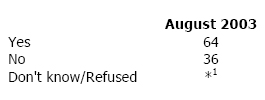
Q4 All in all, how worried are you that you or someone in your family might become a victim of a terrorist attack? Would you say you are very worried, somewhat worried, not too worried or not at all worried?
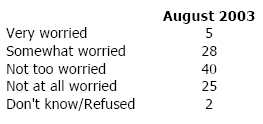
Q5 If you heard that there had been a terrorist attack on the community where you live, where would you go FIRST to get more information about this: television, radio, newspapers, news websites, government websites, your friends and family or government officials?
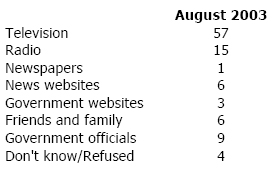
Ask only if Answered on First source, Q5=1-7. (n=962)
Q5b And what is the second source you would go to for information if there had been a terrorist attack on the community where you live?
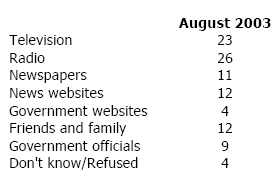
Q6 If there were a terrorist attack on the community where you live, how confident are you that the federal government would quickly provide you with accurate information to help you protect yourself and your family…very confident, somewhat confident, not very confident, not confident at all?
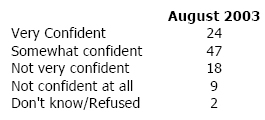
Q7 Should the government notify Americans on their cell phones and pagers if there is a terrorist attack… or are there better ways for the government to notify people? {NEW}

Q8 Should the government notify Americans via email if there is a terrorist attack … or are there better ways for the government to notify people?

Q9 The federal government is seeking information from major American corporations on how they may be vulnerable to terrorist attacks. Some corporations have resisted providing such information, fearing it might be misused. Which is closer to your view: the government should get this information from corporations or corporations should NOT be required to provide this information?
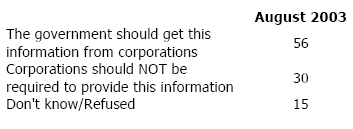
Q10 Some experts have warned that terrorists may try to cripple major American banks, utilities and other corporations by hacking into their computers. How worried are you that terrorists might cripple American corporations by hacking into their computers? Would you say you are very worried, somewhat worried, not too worried or not at all worried?
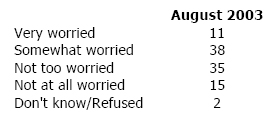
Q11 Have you ever gone online to a federal, state or local government website to look for information about how to protect yourself and your family in case of another terrorist attack?

ASK IF Went to website, Q11=1. (n=114)
Q12 At the government website(s) you visited, how much useful information did you find about protecting yourself and your family…a great deal of information, some, a little, or not much at all?
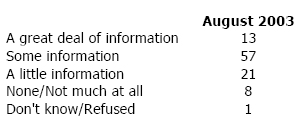
Q13 You may have heard of the federal government’s Homeland Security Advisory System that uses different colors to indicate the current level of threats of terrorist attacks. Do you think this Advisory System provides you with useful information that you can use to decide what precautions to take in case of possible terrorist attacks?

Contacts for further research
Judi Hasson
Editor at Large – author of cover story on the survey
Federal Computer Week
703-876-5099
Kenneth B. Allen
Executive Director
Partnership for Public Warning
703-883-7620
703-883-2745
Ivo H. Daalder
Senior Fellow – analyst of the survey data
The Brookings Institution
1775 Massachusetts Avenue, NW
Washington, DC 20036
Tel. (202) 797-6185
Harris Miller
President
Information Technology Association of America
703-284-5340
Evans Witt
President
Princeton Survey Research Associates – survey firm that conducted the research
202-293-4710 ext. 8




